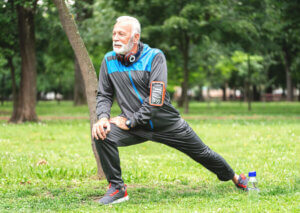How Does Exercise Help Prevent Alzheimer's?

Preventing Alzheimer’s disease is one of the biggest challenges facing modern science. The consequences of this disease can be devastating and health professionals are concerned that it’s appearing in increasingly younger patients. However, one thing that’s been shown to help prevent Alzheimer’s is physical exercise.
Alzheimer’s is a neurodegenerative disease that causes problems with memory, thought processes, and behavior. It’s the most common form of dementia, and according to a study in the journal Neurología, five percent of the European population suffers from it.
Exercise can help prevent Alzheimer’s
Unfortunately, there’s no cure for Alzheimer’s and the symptoms will become increasingly worse until the patient no longer recognizes their surroundings. But despite this, there are a number of treatments that can help slow or even prevent Alzheimer’s.
Physical exercise is well-known to help keep the brain healthy, and it’s also been shown to help prevent degenerative diseases such as Alzheimer’s and Parkinson’s. So, what sort of benefits does exercise give to the brain?
Increased blood flow to the brain
One of the main changes that happen when you exercise is that the blood contains more oxygen. This means that more oxygen reaches the brain. In turn, this delivers nutrients to the brain cells and helps maintain neurons.

For people who suffer from Alzheimer’s this increase in oxygen levels is particularly beneficial since the disease reduces blood supply to the brain, causing neurons to die.
This increase in oxygen levels also causes new capillaries to form. This increases the blood flow to more areas of the brain and reduces the chances of neurons dying in a specific area.
It stimulates cognitive processes
Doing physical exercise is about much more than just moving muscles and bones. Sport includes a significant mental component where cognitive processes such as attention and memory have to be active for good performance.
According to a study published in Experimental Gerontology, physical exercise is an effective way of improving cognitive processes. Furthermore, this effect occurs regardless of age.
It has benefits for cerebral plasticity
The brain is the most incredible organ that we have. This means that it’s capable of creating new networks and connections when the existing ones fail. The great thing about this is that it happens throughout your whole lifetime.
So what does this have to do with physical exercise? Well, sport and exercise have a positive effect on the secretion of Insulin-like Growth Factor 1 (IGF-1). This substance is released by the muscles when we exercise and, when it reaches the brain, it protects the neurons. Therefore, the more active your muscles are, the more your brain is protected.
It increases cognitive reserve
Cognitive reserve is the brain’s capacity to resist damage and still function. Basically, the more cognitive reserve you have, the greater the brain can withstand the effects of aging and neurodegenerative diseases.

A study at Ramón Llull University found that the brains of older people who were active contained more grey matter. This shows that an active lifestyle can be an important protection factor not just to protect against Alzheimer’s but any damage as a result of aging.
You can take steps to help prevent Alzheimer’s
It would be rather simplistic to claim a cause-and-effect relationship between a sedentary lifestyle and Alzheimer’s. There are numerous biological, psychological, and environmental factors that are also at play. However, maintaining an active lifestyle can be a significant step in trying to prevent this disease.
According to a review published in the Revista Cubana de Salud Pública (Cuban Journal of Public Health), high-intensity physical exercise can reduce the risk of Alzheimer’s by between 37 and 50 percent. With data like this, there’s no reason not to start looking after your brain now before it’s too late!
Preventing Alzheimer’s disease is one of the biggest challenges facing modern science. The consequences of this disease can be devastating and health professionals are concerned that it’s appearing in increasingly younger patients. However, one thing that’s been shown to help prevent Alzheimer’s is physical exercise.
Alzheimer’s is a neurodegenerative disease that causes problems with memory, thought processes, and behavior. It’s the most common form of dementia, and according to a study in the journal Neurología, five percent of the European population suffers from it.
Exercise can help prevent Alzheimer’s
Unfortunately, there’s no cure for Alzheimer’s and the symptoms will become increasingly worse until the patient no longer recognizes their surroundings. But despite this, there are a number of treatments that can help slow or even prevent Alzheimer’s.
Physical exercise is well-known to help keep the brain healthy, and it’s also been shown to help prevent degenerative diseases such as Alzheimer’s and Parkinson’s. So, what sort of benefits does exercise give to the brain?
Increased blood flow to the brain
One of the main changes that happen when you exercise is that the blood contains more oxygen. This means that more oxygen reaches the brain. In turn, this delivers nutrients to the brain cells and helps maintain neurons.

For people who suffer from Alzheimer’s this increase in oxygen levels is particularly beneficial since the disease reduces blood supply to the brain, causing neurons to die.
This increase in oxygen levels also causes new capillaries to form. This increases the blood flow to more areas of the brain and reduces the chances of neurons dying in a specific area.
It stimulates cognitive processes
Doing physical exercise is about much more than just moving muscles and bones. Sport includes a significant mental component where cognitive processes such as attention and memory have to be active for good performance.
According to a study published in Experimental Gerontology, physical exercise is an effective way of improving cognitive processes. Furthermore, this effect occurs regardless of age.
It has benefits for cerebral plasticity
The brain is the most incredible organ that we have. This means that it’s capable of creating new networks and connections when the existing ones fail. The great thing about this is that it happens throughout your whole lifetime.
So what does this have to do with physical exercise? Well, sport and exercise have a positive effect on the secretion of Insulin-like Growth Factor 1 (IGF-1). This substance is released by the muscles when we exercise and, when it reaches the brain, it protects the neurons. Therefore, the more active your muscles are, the more your brain is protected.
It increases cognitive reserve
Cognitive reserve is the brain’s capacity to resist damage and still function. Basically, the more cognitive reserve you have, the greater the brain can withstand the effects of aging and neurodegenerative diseases.

A study at Ramón Llull University found that the brains of older people who were active contained more grey matter. This shows that an active lifestyle can be an important protection factor not just to protect against Alzheimer’s but any damage as a result of aging.
You can take steps to help prevent Alzheimer’s
It would be rather simplistic to claim a cause-and-effect relationship between a sedentary lifestyle and Alzheimer’s. There are numerous biological, psychological, and environmental factors that are also at play. However, maintaining an active lifestyle can be a significant step in trying to prevent this disease.
According to a review published in the Revista Cubana de Salud Pública (Cuban Journal of Public Health), high-intensity physical exercise can reduce the risk of Alzheimer’s by between 37 and 50 percent. With data like this, there’s no reason not to start looking after your brain now before it’s too late!
All cited sources were thoroughly reviewed by our team to ensure their quality, reliability, currency, and validity. The bibliography of this article was considered reliable and of academic or scientific accuracy.
- Castro-Jiménez, L. E., y Galvis-Fajardo, C. A. (2018). Efecto de la actividad física sobre el deterioro cognitivo y la demencia. Revista cubana de salud pública, 44, e979.
- Fortuño-Godes, J. (2017). Relación entre ejercicio físico y procesos cognitivos en las personas mayores. Agora para la educación física y el deporte, 19(1), 73-87.
- Lucas, S. J., Ainslie, P. N., Murrell, C. J., Thomas, K. N., Franz, E. A., y Cotter, J. D. (2012). Effect of age on exercise-induced alterations in cognitive executive function: relationship to cerebral perfusion. Experimental gerontology, 47(8), 541-551.
- Niu, H., Álvarez-Álvarez, I., Guillén-Grima, F., y Aguinaga-Ontoso, I. (2017). Prevalencia e incidencia de la enfermedad de Alzheimer en Europa: metaanálisis. Neurología, 32(8), 523-532.
This text is provided for informational purposes only and does not replace consultation with a professional. If in doubt, consult your specialist.








